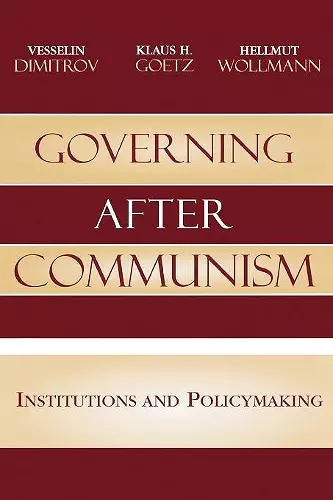Governing after Communism
Institutions and Policymaking
Hellmut Wollmann author Vesselin Dimitrov author Klaus H Goetz author
Format:Paperback
Publisher:Rowman & Littlefield
Published:27th Apr '06
Currently unavailable, and unfortunately no date known when it will be back
This paperback is available in another edition too:
- Hardback£105.00(9780742540088)

This timely comparative analysis explores the evolution of governance in Central and Eastern Europe. The book considers post-communist leaders' key challenge: the development of central government institutions capable of coordinating, integrating, and steering the policymaking process. Building on a broad range of primary sources and extensive field research, the distinguished authors analyze the processes and outcomes of institution-building in Hungary, Poland, the Czech Republic, and Bulgaria since the late 1980s. They examine in detail the organization and inner workings of central executives; explain differences in executive trajectories across time and countries by considering the influence of institutional legacies, the impact of evolving party systems, and the role of crises in spurring institutional change; and show the effects of executive institutions on patterns of public policy, especially the budgetary process. Through a rigorous application of the core-executive framework, this study offers nuanced conceptual and analytical insights that will enhance understanding of both the evolving institutions of Central and Eastern Europe and the more stable West European systems. The in-depth analysis of the development of national executive institutions casts a distinctive new light on debates about EU enlargement, Europeanization, and patterns of governance.
A landmark text in the study of the new post-communist political systems in post-Cold War Europe. It offers fresh and illuminating insights into how executives are configured and function in the fast-changing contexts of transition, modernization, and Europeanization. It is a major contribution to comparative politics and required reading for all who wish to understand an essential aspect of how the new Europe functions. -- Kenneth Dyson, Cardiff University, Wales
Recommended. * CHOICE *
Undoubtedly, this book is successful in the important task of clearing out the empirical terrain. In so doing, it raises a number of interesting questions about post-communist cabinets and institutions which authors are steadily engaged in addressing in their near future research. * Political Studies Review *
An impressive, scholarly, and timely piece of work that provides substantial insight and empirical research in an area of rapidly growing importance. -- Paul Lewis, Open University
ISBN: 9780742540095
Dimensions: 235mm x 151mm x 17mm
Weight: 399g
310 pages